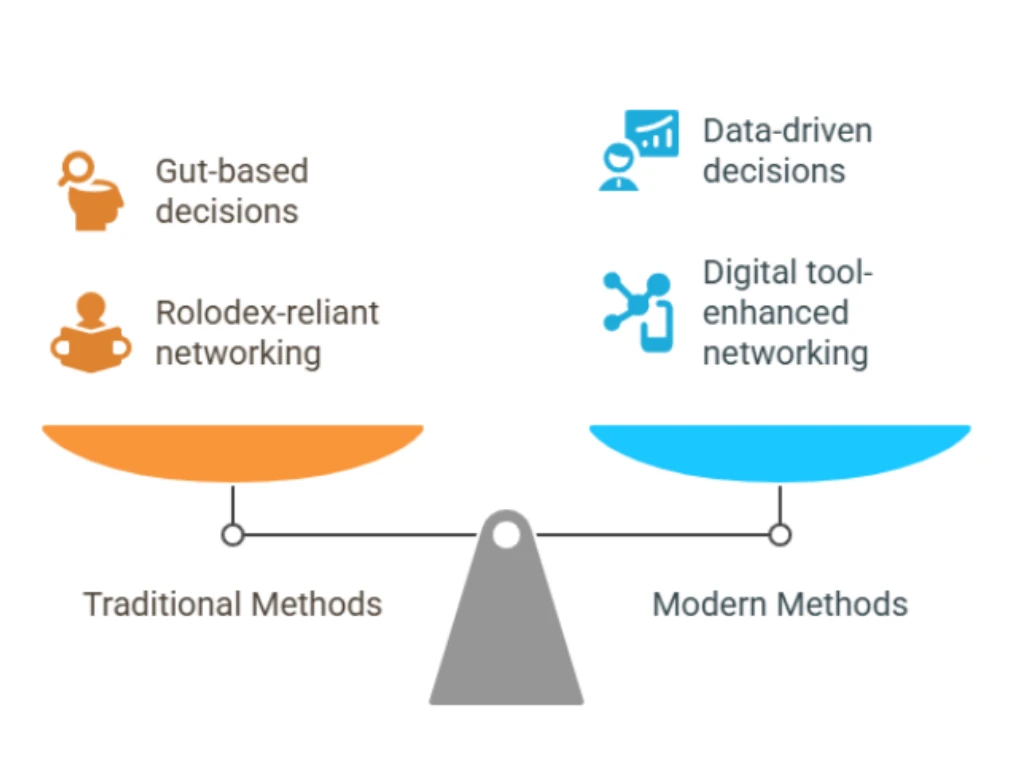Look, I’ve been in commercial real estate for 15 years, and I can tell you something’s fundamentally different now. The game has changed. Just last week, I was showing a client around some properties using Realmo‘s platform, and it hit me again – the old ways of doing business are practically obsolete.
When I started out, success meant having the right Rolodex and trusting your gut. Those days? They’re over. Sure, relationships still matter – they always will – but if you’re not using technology to back up your instincts, you’re flying blind.
The guys making serious money today aren’t just old-school networkers anymore. They’re the ones who figured out how to marry traditional CRE knowledge with digital tools. And frankly, it’s not even close.
The Paradigm Shift I’m Experiencing
Here’s what happened to me last year: I was competing for a mixed-use property in Phoenix against three other investors. Same deal, same numbers, same timeline. Except I had something they didn’t – real-time market data that showed a major employer planning to relocate 2,000 jobs to that area within 18 months.
My competitors were still making decisions based on last quarter’s reports. I was looking at tomorrow’s reality.
That’s the shift. It’s not about having more data – it’s about having better data, faster. And knowing what to do with it.
What You’ll Discover in This Guide
I’m not going to waste your time with theoretical nonsense. This guide covers the actual tools I use every day, the mistakes I’ve made (and learned from), and the strategies that consistently put money in my pocket.
More importantly, I’ll show you how to implement this stuff without turning your business upside down. Because trust me – I’ve seen too many investors try to go digital overnight and crash and burn.
Navigating Today’s Complex CRE Market: A Digital Imperative
The commercial real estate market today is brutal. Information moves at light speed, competition is everywhere, and margins are getting tighter.
You know what separates winners from losers now? Speed and accuracy. The ability to analyze opportunities faster than the next guy, spot trends before they become obvious, and make decisions with confidence while everyone else is still gathering data.
The Challenges I See My Peers Facing
I talk to other investors constantly – at conferences, over drinks, wherever we cross paths. Same complaints, over and over.
First: information overload. There’s so much data out there that most guys don’t know where to start. They’re drowning in spreadsheets, PDF reports, and half-baked “analysis” from brokers who don’t know what they’re talking about.
Second: everything takes forever. I know investors who spend weeks analyzing one deal. By the time they’re ready to make an offer, the property’s gone to someone who moved faster.
Third: deal flow sucks. Everyone’s fishing in the same pond, fighting over the same listings. The good stuff – the real opportunities – they’re not even hitting the market.
Unlocking Opportunities: The Digital Advantage
Digital tools solve these problems in ways that seemed impossible five years ago.
Take deal analysis. What used to take my team two weeks now takes two days. We can model different scenarios, stress-test our assumptions, and identify problems before they become expensive mistakes.
But here’s the real kicker: we’re finding deals that other investors don’t even know exist. Off-market opportunities, distressed properties, expansion plays – stuff that never makes it to LoopNet or CoStar.
Last month, I closed on a warehouse in Cleveland that I found through AI-powered market research. My competition was still waiting for their brokers to call them with “opportunities.”
The Digital Toolkit: Fundamental Categories for Modern Investors
After testing probably 50 different platforms over the past three years, I’ve figured out what actually works. The tools that matter fall into four categories – and each one serves a specific purpose.
Data Analytics & Market Intelligence Platforms
Remember when “market research” meant calling your broker and asking what he thought about a neighborhood? Those days are gone.
Market intelligence platforms pull together everything – demographic data, economic indicators, transaction records, zoning changes – into one searchable database. But the real magic happens with predictive analytics.
I can spot emerging markets before they become obvious. I can predict rent growth with scary accuracy. I can identify risks that don’t show up in traditional analysis.
Example: I was looking at office properties in Nashville last year. The platform flagged a correlation between new healthcare companies moving to the area and office vacancy rates. Sounds boring, right? Except it helped me avoid a property that looked great on paper but was sitting in a submarket about to get hammered.
AI-Powered Marketing & Outreach Tools
Property marketing used to be a nightmare. Writing descriptions, creating social media posts, email campaigns – it ate up hours of my team’s time.
AI changed everything. I can input basic property details and get professionally written marketing copy in minutes. Multiple versions, different tones, all optimized for search engines.
I was skeptical at first. The early AI-generated content was garbage. But the quality has improved dramatically, and the consistency is incredible. Every listing maintains the same professional tone and hits the right keywords.
Deal Sourcing & Prospecting Platforms
This is where things get interesting. Traditional networking is still important, but digital platforms can identify opportunities that would never cross your desk otherwise.
I use tools that provide contact information for local businesses, track ownership changes, and identify distressed properties. It’s proactive deal sourcing instead of waiting for brokers to call.
One platform I particularly like tracks business expansion patterns. It monitors news mentions, permit applications, hiring announcements – all the signals that indicate a company might need more space. I can reach out to these companies before they even start looking.
Property & Portfolio Management Software
Once you own properties, management software isn’t optional – it’s essential. These platforms handle rent collection, maintenance requests, financial reporting, lease renewals, all of it.
But the real value comes from the insights. I can track performance metrics across my entire portfolio, identify underperforming assets, and spot trends that might indicate problems or opportunities.
My management software recently flagged unusual utility usage at one of my office buildings. Turned out a tenant was subletting space without permission. Catching this early saved me significant headaches and potential legal issues.
Tools I Rely On: Mastering the Digital Frontier
I’ve tested dozens of platforms. Most of them are garbage. But there are a few that consistently deliver results – and these are the ones I rely on daily.
Unearthing Opportunities with Advanced Data Analysis
AI-powered research tools have become my secret weapon. I can analyze hundreds of data sources simultaneously to identify opportunities that would take human researchers weeks to uncover.
Here’s a real example: I used AI to scan news publications in Maine for mentions of marine industry expansion. This helped me identify potential industrial tenants six months before they started looking for space. By the time they were ready to lease, I had already secured the perfect property.
The property analysis capabilities are equally impressive. I can identify redevelopment opportunities by analyzing tax records, zoning data, and ownership patterns. It’s like having a research team that never sleeps.
Streamlining Valuation & Underwriting Workflows
Valuation and underwriting tools have eliminated most of the grunt work from deal analysis. These platforms automatically pull comparable sales data, calculate key metrics, and generate professional reports.
The accuracy improvement has been huge. Manual calculations are prone to errors, especially when you’re under pressure to get an offer submitted. Automated workflows ensure consistency and catch mistakes before they become problems.
I can now analyze twice as many deals in half the time. In today’s competitive market, speed often determines who gets the best deals.
Enhancing Marketing Reach with AI-Powered Content Generation
Content creation used to be a major bottleneck. Writing compelling property descriptions, social media posts, and email campaigns consumed hours of my team’s time.
AI content generation solved this problem completely. I input property details and instantly receive multiple versions of professionally written marketing copy. The content is consistently high-quality and optimized for search engines.
This has allowed us to maintain a much more active online presence without increasing our marketing budget. Better content means better leads, and better leads mean more deals.
The Real Payoff: Strategic Growth Through Digital Mastery
The efficiency gains are obvious, but the strategic advantages are what really matter. This technology isn’t just making us faster – it’s making us smarter.
Gaining a Competitive Edge in a Crowded Market
Early adoption of digital tools has given me a significant competitive advantage. While my competitors are still using traditional methods, I’m analyzing more deals, identifying better opportunities, and closing transactions faster.
The data insights alone have changed how I evaluate markets. I can spot trends and opportunities that aren’t visible through conventional analysis. This forward-looking approach has led to some of my best investments.
Mitigating Risk and Improving Decision-Making
Risk management has improved dramatically with better data analysis. I can identify potential problems early, stress-test different scenarios, and make more informed decisions about every aspect of an investment.
Recently, predictive analytics helped me avoid a major vacancy issue at a retail property. The data showed subtle changes in local demographics that traditional analysis would have missed. By adjusting our tenant mix strategy proactively, we maintained full occupancy while competitors struggled with vacancies.
Peering into the Future: My Vision for CRE Tech
We’re just getting started. The digital transformation in commercial real estate is accelerating, and the next five years will make the last five look like the stone age.
The Continued Rise of AI and Machine Learning
AI is evolving rapidly, moving beyond simple automation to provide sophisticated market insights and predictive analysis. The next generation of AI tools will understand market dynamics at a level that seems almost intuitive.
We’re already seeing AI that can analyze complex deal structures, identify optimal financing options, and even predict tenant behavior. This technology will continue to automate routine tasks while providing deeper strategic insights.
Blockchain and Smart Contracts for Transparency
Blockchain technology promises to revolutionize how we handle property transactions. Smart contracts could automate lease agreements, ownership transfers, and even property management tasks.
While still emerging, the potential for increased transparency and reduced transaction costs is significant. I’m watching this space closely because early adopters will have substantial advantages.
Immersive Technologies (VR/AR) for Property Tours and Due Diligence
Virtual and augmented reality technologies are beginning to transform property evaluation. Comprehensive virtual tours allow investors to inspect properties remotely, while augmented reality can overlay crucial data directly onto physical spaces.
I recently used VR to evaluate a property in Chicago without leaving my office. The technology provided a more detailed view than traditional photos and videos, allowing me to make informed decisions about the property’s condition and potential.
Your Path to a Smarter CRE Investment Journey
The digital revolution in commercial real estate is happening whether we participate or not. The question isn’t whether to adopt these tools – it’s how quickly you can implement them effectively.
Embrace the Change, Don’t Resist It
Resistance to technology is career suicide in today’s market. The investors who thrive over the next decade will be those who embrace digital tools and integrate them into their core strategies.
This isn’t about replacing human judgment – it’s about augmenting it with better data and more efficient processes. The combination of human experience and digital capabilities is unbeatable.
Start Small, Scale Smart
Don’t try to implement every tool at once. Pick one or two areas where digital solutions can provide immediate benefits, master those tools, then gradually expand your capabilities.
I recommend starting with deal analysis or market research platforms. These provide quick wins that demonstrate the value of digital tools and build confidence for broader implementation.
Your Future in CRE Investing is Digital
Commercial real estate investing is becoming increasingly sophisticated, data-driven, and technology-dependent. The investors who understand this shift and adapt accordingly will dominate the market.
The tools and strategies I’ve outlined aren’t just nice-to-have features – they’re becoming essential for competitive success. The choice is simple: evolve or get left behind.



































